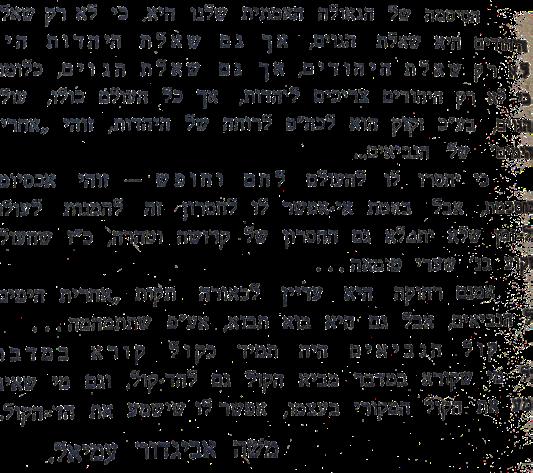
3 minute read
Dates of Redemption Tehila
Gimpel
As Tu BiShvat season descends upon the rolling hills of Judea, my children frequently venture out looking for the first flower buds on the fruit trees surrounding our home on the Arugot Farm. While today our farm looks like a green oasis against the backdrop of sandy dunes and the Dead Sea, it was only a few years ago that this land was indistinguishable from the desert that surrounds it. Six years ago, along with three other pioneering families, my husband Jeremy and I left the comforts of suburban life, and set out with our six children to establish a Torah and agricultural center at the very edge of Jewish settlement in Judea. When we first arrived at our dusty hilltop, the task seemed nothing short of daunting.
Advertisement
“Cursed! Cursed! Cursed!” the elderly Bedouin shepherdess would scream, day after day, at our partner Yossi, when he first began venturing out to what eventually would come to be known as our beloved Arugot. He tried to ignore the seemingly crazy old lady shaking her staff wildly, followed by a small flock of sheep. However, one morning his curiosity got the best of him, and Yossi took advantage of his fluent Arabic to ask her what in the world she was yelling about. “You don’t belong here! This land is cursed! Do you know how many people have tried to plant trees here before you? Why do you think this land is empty? It’s dead soil, everyone knows that!” Yossi knew she wasn’t wrong, and aerial pictures going back decades showed that this patch of land was completely desolate. “Just wait” is all he responded, before going off to another day of digging, planting, tilling and watering.
It was hardly three years later, with our first trees flourishing and weighing heavily with fruits approaching the end of their biblical orlah period, that we received quite a surprising group of visitors. While our children have long grown accustomed to visitors from an array of countries and walks of life, even they were surprised by the arrival of a group of men from the nearby Bedouin village – the very home of Yossi’s shepherdess “friend” with her ominous warnings. Our Muslim neighbors did not arrive empty-handed but rather bearing a unique gift – beautiful handsewn Middle Eastern-style mattresses and cushions for our recently completed shul Jeremy sat with them over black coffee for well over an hour, trying to understand what prompted this unexpected call. They were thankful that we had helped some of them with their tractor troubles, but then they shared something far more profound… They explained that their date trees have been bearing more fruits than before, and they don’t know what to attribute it to other than our arrival. Never at a loss for a dvar Torah, and with Yossi as his translator, Jeremy posited that the extra juicy dates are not just a coincidence but rather the fulfillment of the prophet Yechezkel’s vision in Chapter 36:8: “But you, O mountains of Israel, you shall shoot forth your branches and bear your fruit for My people Israel.” It is in reference to this verse that the Babylonian Talmud (Sanhedrin 98a) states in the name of Rabbi Abba: “There can be no more manifest sign of the redemption than this.” Our sages had a tradition that the first and surest sign of redemption would be the Land of Israel bearing fruits once again. And here, right in front of our very eyes, Israel has transformed from a dry wasteland to a flourishing agricultural powerhouse. For thousands of years, our precious Land, like a treasure chest, locked herself up, waiting for her children to come home and unlock her beauty.
To me this is not just a promise of a physical rejuvenation of the land, but a spiritual one as well. In Yechezkel’s description of the desolation that will characterize the land throughout our exile, there is one particular word that continually repeats itself: neshama. In its context, this word refers to barren wilderness. “And the nations that are left around about you shall know that I, the L-rd, have built up the ruined places and have planted the ‘neshama’ (the desolate ones)” (Yechezkel 35:36). However, it is hard to ignore the other, better known, meaning of neshama as soul; for as Hashem replants and rebuilds the Land of Israel, it is our very souls that He is replanting within us as well. As our physical bodies return to our roots and reconnect with the soil of our ancestors, so our Jewish souls come to their full fruition as well.
Tu BiShvat Sameach!
Tehila Gimpel lives with her husband Jeremy and their six children on the Arugot Farm in eastern Gush Etzion. Tehila is an attorney and currently pursuing her PhD in Jewish Law.
Join Tehila Gimpel at the Weekend of Inspiration UK, 11th – 14th May.






